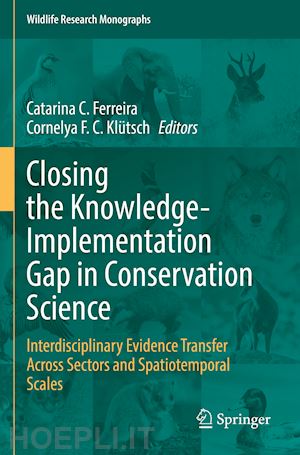

Questo prodotto usufruisce delle SPEDIZIONI GRATIS
selezionando l'opzione Corriere Veloce in fase di ordine.
Pagabile anche con Carta della cultura giovani e del merito, 18App Bonus Cultura e Carta del Docente
This book aims to synthesize the state of the art on biodiversity knowledge exchange practices to understand where and how improvements can be made to close the knowledge-implementation gap in conservation science and advance this interdisciplinary topic. Bringing together the most prominent scholars and practitioners in the field, the book looks into the various sources used to produce biodiversity knowledge - from natural and social sciences to Traditional Ecological Knowledge and Citizen Science - as well as knowledge mobilization approaches to highlight the key ingredients that render successful conservation action at a global scale. By doing so, the book identified major current challenges and opportunities in the field, for different sectors that generate, mobilize, and use biodiversity knowledge (like academia, boundary organizations, practitioners, and policy-makers), to further develop cross-sectorial knowledge mobilization strategies and enhance evidence-informed decision-making processes globally.
Part 1 Introduction.- 1 The Knowledge-Implementation Gap in Conservation Science.- Part 2 The Knowledge Production Or Co-Production.- 2 Biodiversity Monitoring and the Role of Scientists in the 21st Century.- 3 Closing the Conservation Genetics Gap: Integrating Genetic Knowledge in Conservation Management to Ensure Evolutionary Potential.- 4 Publicly generated data: the role of Citizen-Science for knowledge production, action, and public engagement.- 5 Global Overview of Indigenous Ecological Knowledge and Implementation in National Conservation Agendas.- Part 3 The Knowledge Mediation Sphere.- 6 The Knowledge Network: Identifying Actors and Structural Dimensions of Knowledge Transfer.- 7 Communication: The bridge between knowledge and implementation.- 8 Making an impact: how to design relevant and usable decision support systems for conservation.- Part 4 The Knowledge-Action Outcome(s).- 9 The use of boundary-spanning organizations to bridge the knowledge-action gap in North America.- 10 Progress and gaps in biodiversity data mainstreaming and knowledge transfer for conservation in South America.- 11 Conservation Science in Africa: Mainstreaming Biodiversity Information into Policy and Decision-making.- 12 The Marine Conservation Landscape in Europe: Knowledge Support to Policy Implementation and Conservation Action.- 13 Translating research into wildlife conservation actions through multi-sector collaboration in tropical Asia.- 14 Environmental knowledge exchange in Australia and Oceania: how researchers and practitioners are working together to bring change.- Part 5 Synthesis.- 15 Closing the gap between knowledge and implementation in conservation science: concluding remarks.
Dr. Catarina C. Ferreira is a broadly trained conservation biologist, with twenty years of international experience in the research, project management and policy arenas. She holds two MSc degrees in Applied Ecology (University of Porto, Portugal) and Wildlife Management (Castilla-La Mancha University, Spain), a PhD in Biology from Castilla-La Mancha University (Spain) and has done 5 years of postdoctoral research between Trent University (Ontario, Canada) and the Helmholtz Centre for Environmental Research - UFZ (Leipzig, Germany). As an academic, she developed a strong scientific background specializing in terrestrial ecology and wildlife management, having dedicated her career to advance our understanding of the impacts human-induced stressors have on biodiversity. She has published over 30 scientific papers in peer-reviewed top-tier journals, as well as contributed to or co-authored 4 books and participated in multiple science outreach activities. She received numerous grants throughout her career, including a Marie-Sklodowska-Curie International Outgoing Fellowship between 2015-2017 and a Mitacs Canadian Science Policy Fellowship in 2020. As a conservation scientist, she has a rich cross-sectoral experience in the environmental public, private and not-for-profit sectors in Europe and North America, where she acted as a knowledge broker to support evidence-informed policy decisions. Notably, among other roles, she was the Assistant Director of the first and only Iberian Lynx Captive Breeding Centre in Portugal in 2009-2010, and the European Biodiversity Conservation Coordinator at IUCN in Belgium between 2018 and 2020. She is currently working for the Canadian Food Inspection Agency as a Policy and Program Analyst of cross-cutting plant health issues.
Dr. Cornelya F. C. Klütsch works at the interface of molecular ecology, genomics, and conservation. Her main research interests include the use of genetic and genomic tools to address applied and basic conservation as well as eco-evolutionary questions in wildlife species. She received her Master’s degree in zoology at the Martin Luther University of Halle-Wittenberg (Germany). Subsequently, she completed a PhD at the Alexander Koenig Research Museum and the Rheinische Friedrich-Wilhelms University in Bonn (Germany). She then continued her research by pursuing international postdoctoral research positions at the Royal Institute of Technology in Stockholm (KTH, Sweden) and at Trent University in Peterborough (Ontario, Canada). Currently, she is a Research Scientist in Molecular Ecology at the Norwegian Institute of Bioeconomy Research (NIBIO, Norway) where she works in a transnational, interdisciplinary, and inter-sectorial framework on local, regional, and international conservation issues.











Il sito utilizza cookie ed altri strumenti di tracciamento che raccolgono informazioni dal dispositivo dell’utente. Oltre ai cookie tecnici ed analitici aggregati, strettamente necessari per il funzionamento di questo sito web, previo consenso dell’utente possono essere installati cookie di profilazione e marketing e cookie dei social media. Cliccando su “Accetto tutti i cookie” saranno attivate tutte le categorie di cookie. Per accettare solo deterninate categorie di cookie, cliccare invece su “Impostazioni cookie”. Chiudendo il banner o continuando a navigare saranno installati solo cookie tecnici. Per maggiori dettagli, consultare la Cookie Policy.